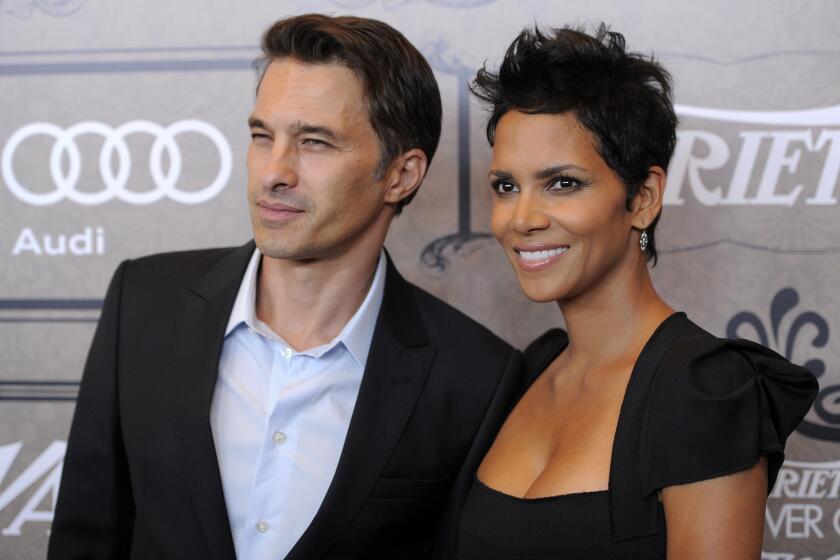Review: ‘A Private War’ is as unflinching as its subject, reporter Marie Colvin
War correspondent Marie Colvin fought not one but numerous personal battles in her violently abbreviated. life and director Matthew Heineman and star Rosamund Pike have joined forces to persuasively handle them all in the gripping and insightful “A Private War.”
Colvin was the two-time winner of the British Foreign Journalist of the Year Award and something of a celebrity among her peers in the time before she was killed in Syria in 2012, and though some of her struggles can be surmised, they are still brutally involving.
For openers, Colvin took the injustices of the world personally and made it her unwavering mission as a reporter to expose them as widely as possible.
“I have to go to places where you could be killed, to make that suffering part of the record,” Pike as Colvin says in voice-over in Arash Amel’s smart and well-crafted script. “I see it so you don’t have to.”
More than that, Colvin continually fought with the non-combat zone world, fought to make people who were safe at home pay attention to those who were not. “I cared enough to go to these places to make someone else care,” she says. “We fail if we don’t face what war does.”
Perhaps inevitably, Colvin also had major battles with herself. Her work came at a steep personal price that included alcoholism and intense, disturbing bouts of PTSD that “A Private War” puts on-screen.
For this impressive film pulls few punches in unflinchingly detailing from the inside — graphic nightmares included — the complexity of the effect war had on Colvin and the world surrounding her.
Though this is his first dramatic feature, Heineman is the key to “A Private War’s” narrative realism. His previous in harm’s way films, the exceptional documentaries “City of Ghosts,” about resistance to Islamic State, and “Cartel Land,” concerned with the Mexican drug trade, made this a story he could tell from the inside.
“Like Marie,” Heinman says in a director’s statement, “I have felt that same bizarre thrill that conflict reporting brings and also felt the lingering dark thoughts that are an unavoidable consequence of it.”
Though Charlize Theron, one of the film’s producers, reportedly considered playing Colvin at one point, “A Private War” is fortunate in having Pike in the leading role.
An actress who doesn’t always get the credit she should for potent work in unusual and challenging roles (“Gone Girl,” “Hostiles,” “United Kingdom” and “Beirut,” among others), Pike lobbied to play Colvin and has succeeded exceptionally well.
It’s not just that Pike changed the timbre of her voice, the way she walks and even her posture to accurately reflect Colvin physically (though she has).
It’s that this fierce, lived-in performance, complete down to the drawn face and go-for-it personality, is so convincing that people who knew Colvin were shaken at the resemblance.
Based on a Vanity Fair profile by Marie Brenner, “A Private War” opens with an aerial shot of Homs, Syria, in 2012, a visual that reveals the catastrophic damage the city suffered at the hands of forces loyal to Bashar Assad.
Homs proved to be Colvin’s Waterloo, and the film never lets us forget that as it flashes back, identifying each sequence by telling us how many years before Homs it took place.
“Private War” starts in London in 2001 with one of Colvin’s stabs at living an at-home life with an ex-husband with whom she is trying to reconcile.
Though born and raised on the North Shore of Long Island, Colvin worked for Britain’s Sunday Times, where her ambitious editor Sean Ryan (Tom Hollander) both wants her to shine and fears for her safety.
Against Ryan’s advice, Colvin goes to Sri Lanka to interview a leader of the Tamil Tiger insurgency. On her way out of the combat zone, she is struck by shrapnel and loses the sight in her left eye.
Though she initially hates the idea of wearing an eye patch (“the worst idea I ever heard”), Colvin soon embraces it as a personal trademark back in London. But staying lionized at home is not on her agenda, and she tells Ryan that, injury or not, she has no intention of “hanging up my flak jacket.”
Colvin’s next major assignment is Iraq in 2003, where she teams up with freelance photographer Paul Conroy (excellent work by “Fifty Shades” veteran Jamie Dornan) to check out rumors of mass graves outside Fallujah.
This section, which includes a nerve-wracking session at a government checkpoint and the harrowing discovery of those graves, is perhaps the film’s most potent and underscores the effectiveness of Heineman’s passion for authenticity.
Working with veteran cinematographer Robert Richardson and production designer Sophie Becher, the director has created a vivid sense of what it feels like being on the ground. And the agonizing mourning at the gravesite is enhanced by the use of Iraqi refugees living in Jordan, where the film was shot, as extras.
Though she well knew the line that foreign correspondents who are both old and bold are nonexistent, Colvin could not resist going to Homs. The notion that anywhere in the world, “people are dying and nobody knows its happening” always made her crazy, and “A Private War” is a moving tribute to that magnificent obsession.
“A Private War”
MPAA rating: R, for disturbing violent images, language throughout, and brief sexuality/nudity
Running time: 1 hour, 50 minutes
Playing: ArcLight Hollywood; Landmark, West Los Angeles
More to Read
Only good movies
Get the Indie Focus newsletter, Mark Olsen's weekly guide to the world of cinema.
You may occasionally receive promotional content from the Los Angeles Times.











